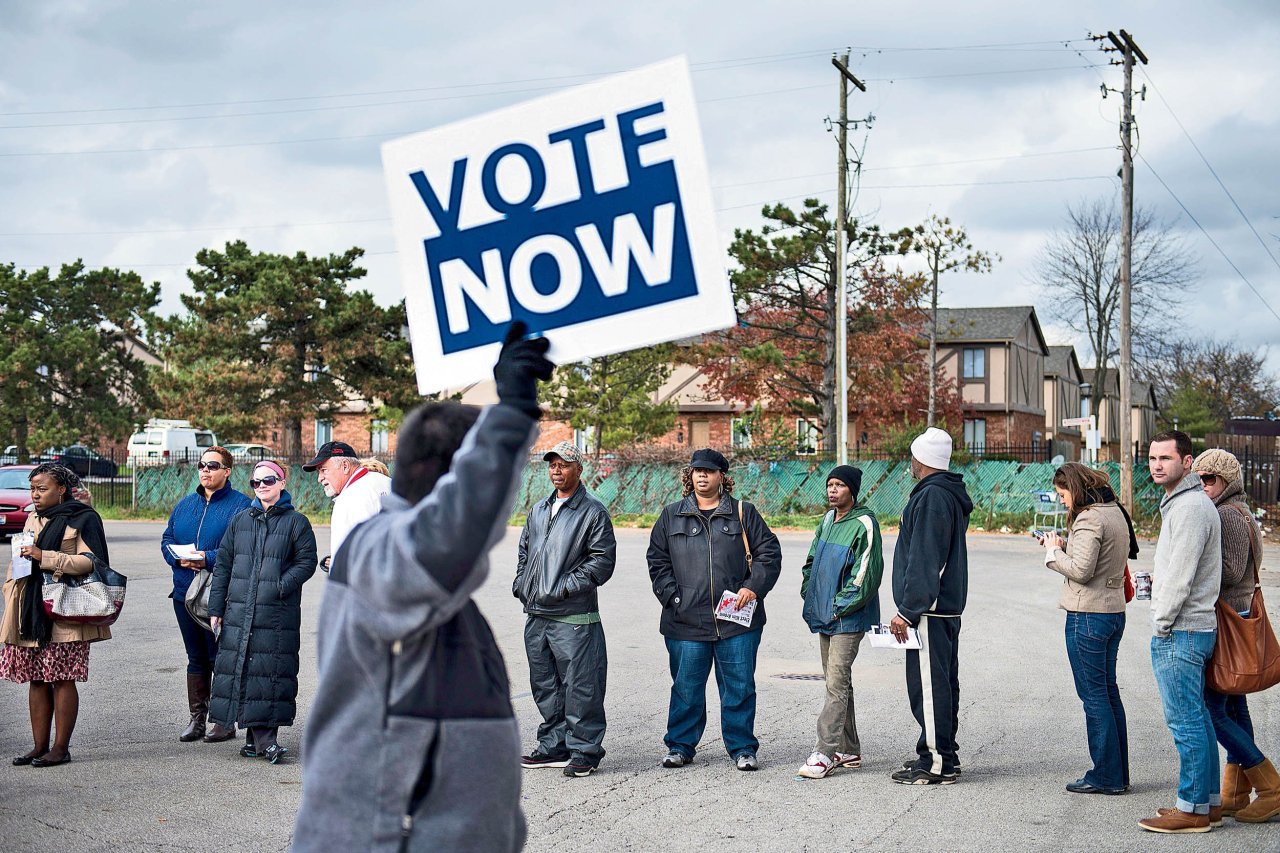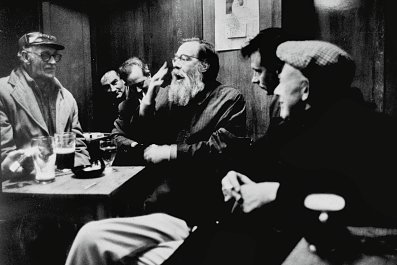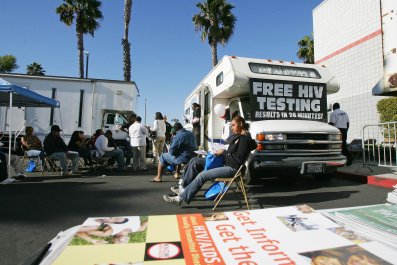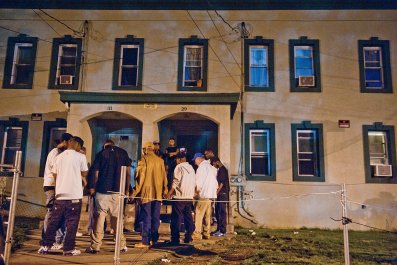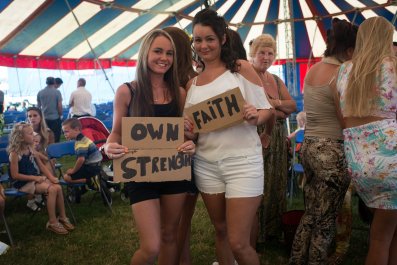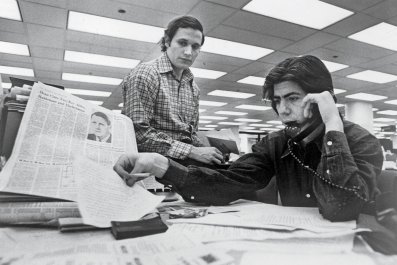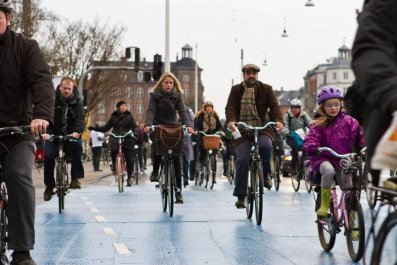I may have been America's last holdout, but I'm finally ready to accept what everyone else seems to have acknowledged long ago: The concept of an apolitical judiciary—carefully interpreting laws, the Constitution and precedent with little thought of policy preferences—is dead. What we have instead are unelected super-legislators clothed in black robes who do handsprings to approve—or shoot down—public policy based on their political beliefs.
There are judges who ground their rulings on logical, unbiased interpretations of our Constitution, our laws and our place in history, but for the most part, the ideal has been killed. And the primary perpetrators of this unforgivable assassination sit on the Supreme Court.
This is not a question of liberal or conservative. There have been times when the court upheld policies I support with what I considered absurd decisions, and times it knocked them down with rulings that seemed reasonable. I believe in a woman's right to choose and personal privacy, but I thought the constitutional pretzels the court turned itself into with both Roe v. Wade (the 1973 case that legalized abortion) and Griswold v. Connecticut (which in 1965 prohibited states from restricting the purchase of contraception) were obvious. Justice Potter Stewart had it about right in his dissent when he labeled the Connecticut statute "an uncommonly silly law" but constitutional nonetheless. There have also been times when a well-reasoned ruling went counter to the outcome I wanted, but I understood that the Supreme Court was supposed to be policy-neutral, an ideal reflected in Stewart's comment in Griswold.
Of late, though, the rationale of some rulings is tough to comprehend. Start with Citizens United v. Federal Elections Commission, the 2010 case that awarded constitutional rights to corporations and held that they could not be limited in how much they could spend to influence an election. This decision transformed our electoral process into a plaything for billionaires and has done more to undermine democracy than virtually any ruling in history.
Chief Justice John Roberts attempted to excuse the inexcusable by feebly rationalizing why this was not an exercise in judicial activism. The court was undoubtedly ruling against precedent, contrary to "stare decisis"—once the near-inviolate standard that courts should respect prior rulings. Oh no, no, Roberts opined: Courts were required to overrule precedent in extreme situations. Yes, making sure corporations get constitutional rights is on par with overruling Plessy v. Ferguson, the 1896 case upholding segregation. It's amazing that granting corporate constitutional rights was so clearly the intent of the Founders when neither they nor hundreds of justices over more than two centuries saw it until Roberts and his pals came along.
The next troubling ruling was in National Federation of Independent Business v. Sebelius, which upheld Obamacare and outraged conservatives. Many of the arguments from the conservative judges—both in opposition and in support of the majority ruling—made no sense. Justice Antonin Scalia was the king of inconsistency, turning upside down his interpretation of a prior case. Roberts's opinion was a train wreck, made even messier by his efforts to once again sidestep precedents. Then there was the portion of the decision that declared Congress—despite its authority under the Constitution's Spending Clause—could not require states to expand Medicaid eligibility to qualify for future grants. The reasoning was complicated, but the arguments by the conservative members of the court will come up again in ways they won't like—and then they will probably ignore the precedent they have set.
Next up, Burwell v. Hobby Lobby, this year. The court's decision has so much dancing around reason and law that it would shame the Bolshoi Ballet, and was written by the justice who is easily the most unfit to sit on the court in my lifetime: Samuel Alito Jr.
Like Justice Clarence Thomas on the right and Justice Sonia Sotomayor on the left, Alito is predictable on pretty much every ruling. But unlike other justices who at least try to drape their policy-driven approach in a veil of objective respectability, Alito is a political hack with no sense of the standards a justice is supposed to exhibit. Alito had the unmitigated, perhaps unprecedented, gall to shake his head and all but roll his eyesat the president of the United States during a State of the Union address when Obama described—correctly—the damage that could follow the Citizens United decision. You could almost hear Alito thinking: Decorum? Objectivity? To hell with 'em! I'm smarter than you, Barry Hussein!
Then there are Alito's efforts to help Republicans raise money by attending and speaking at soirees with corporate fund-raisers and GOP operatives. (Thomas and Scalia have done the same thing, but not as blatantly as Alito.) Alito hasn't even attempted to hide what he is: a politician who happens to sit on the Supreme Court.
There is so much nonsense in Hobby Lobby that it could take up an entire issue of Newsweek to explain it all. Hobby Lobby—an arts and crafts store founded by self-made billionaire David Green—objected under what it claimed were religious grounds to Obamacare rules that required employer-sponsored insurance plans to cover the cost of 20 types of contraceptives. Note that until 2012—the year the company filed suit—Hobby Lobby had offered insurance that covered the very types of contraception its owners suddenly found so objectionable.
Enter the Alito clown car. The majority decision rightfully concluded that corporations do not have a constitutional right to ignore laws based on religious convictions—imagine the chaos otherwise. Instead, Alito relied on the Religious Freedom Restoration Act, a 1993 law that requires strict scrutiny when a generally applicable statute "substantially burden[s] a person's exercise of religion." Note the word "person."
Although at no point did Congress suggest that the "person" referenced there could be a corporation, Alito decided that's what the legislators meant, latching on to an 1871 law called the Dictionary Act, which courts have often viewed as a tool of last resort, as justification.
Virtually crafting his own laws, Alito declared that rights under the law apply only to "closely held corporations"—a term he doesn't bother to define. It would be as if Alito ruled that cases involving the rights of certain people required strict scrutiny, but then refused to say what kinds of people he was talking about. Under definitions by the Internal Revenue Service, a closely held corporation means one with five or fewer owners. Is that what Alito meant? Who knows? In the end, he granted religious freedom to types of corporations that perhaps he will define later.
There are, of course, occasional rulings that seem to go against the grain. The decision on October 6 not to take up cases involving gay marriage might be seen as the court affirming the rulings of lower courts upholding it. Or it might be the justices attempting to punt on the issue until they are sure an irreconcilable split emerges between circuits. Either way, since it takes just four justices to decide to hear a case, at least two conservatives on the court voted against hearing the cases now. So it was either constitutionality, cowardice or a desire to wait until the lower court rulings shake out.
Which brings us to my camel-back-breaker, the court's action on September 29 in an Ohio voting case. Ohio has been at the forefront of a campaign by Republican-led states to keep the poor, students and other citizens who are more likely to vote Democratic from being able to cast a ballot (an effort made all the easier by the court's decision to gut the Voting Rights Act). This insidious campaign aims to cut back on early voting, particularly on Sundays. In Florida and Ohio, early voting was adopted to lessen hours-long lines on Election Day that had dissuaded some people from casting their ballots.
A 2012 report in The Palm Beach Post quoted former Republican officeholders and strategists who said that once the party realized how many Democratic voters were turning up at the polls because of the longer schedules, GOP legislators wrote legislation to cut them back. In particular, they wanted to limit Sunday voting, which is used by black churches to organize buses and carpools to bring parishioners to the polls. "I know that the cutting out of the Sunday before Election Day was one of their targets only because that's a big day when the black churches organize themselves," one GOP consultant told the Post.
Ohio's Republican secretary of state, Jon Husted, has implemented every rule imaginable to impede the voting of people not like him. On February 25, he issued rules for primary and general elections that excluded early voting hours for the Sunday immediately preceding Election Day. Obviously, it is just a strange and amazing coincidence that this is what the Republican operative told the Post was a tactic designed to minimize the black vote. The schedule for early voting allowed by Husted was so convoluted it took a court 10 lines of type in a paragraph to describe them.
The court knocked down that Rube Goldberg attempt, so Husted issued a directive setting uniform early voting hours, despite the fact that no statute requires this and local election boards, by law, set their own times of operation. Once again, Husted eliminated those times when black voters historically showed up in the largest numbers. Barred by permanent injunction from stopping voting on the Sunday before the election, Husted did the next best thing: He shut down the polls on every other Sunday. He also eliminated something called the Golden Week, when a citizen could register to vote and cast a ballot on the same day.
Seven plaintiffs brought suit in federal court, where their case was heard by U.S. District Senior Judge Peter C. Economus, who filed his 71-page opinion on September 4. The decision enjoined Husted from "capriciously" changing the schedules in ways that Economus found burdened "the right to vote of certain groups of voters"—specifically, minorities and the poor. Sunday voting, Economus found, was relied upon by many black citizens because of the church-organized transportation through a system nicknamed "Souls to the Polls."
Economus was particularly strong on the issue of the Golden Week. He wrote that "the opportunity to register and vote at the same time during Golden Week is more than a mere convenience to poorer individuals and the homeless, it can make the difference between being able to exercise the fundamental right to vote and not being able to do so. Accordingly, the elimination of Golden Week burdens the right to vote."
Sixteen hours before Golden Week was scheduled to begin, without holding a hearing or reading a brief, the five conservative justices on the Supreme Court came trouncing in, placing a hold on Economus's injunction. Golden Week was stopped in its tracks. For what may be the first time in generations, Supreme Court Justices stood in front of the polling places and told voters—mostly minorities, most likely Democrats—to stay home.
The Supreme Court declared that the decision to block scheduling rules issued by a man whose motives are deeply suspect raised such troubling concerns that it urgently needed to force the very action that the lower court found would impede the voting of the poor and minorities. And the justices did it without a hearing, without a ruling, without a brief, without evidence.
Golden Week has passed, and the Supreme Court's order blocking changes in Husted's rules will remain in effect until it acts on an appeal by the state. There's no telling when that might be; the state hasn't even formally filed a petition.
Suppose, for a moment, the justices are objective and apolitical. Imagine—against all probabilities—that they rule Economus was correct—that eliminating Golden Week impermissibly burdened the right to vote. How, exactly, are they going to reverse the damage in Ohio from their cynical act? Would conservatives on the court call for a do-over? Would they shrug and say, "Oh, well—you'll get your rights back next time." Of course not. Briefs aren't even in the justices' hands yet, but it is already obvious what the decision will be. If the conservatives rule against Husted, thus declaring that eliminating Golden Week did indeed create unlawful burdens, they will go down as the first justices in American history who admitted to having impeded Americans' constitutional voting rights.
But that almost certainly won't happen. The Republican Party of the United States Supreme Court would never let it.



